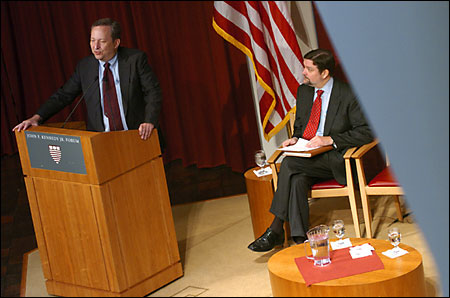Conference opens with a worldly perspective
KSG conference focuses on challenges ahead

The 2005 Kennedy School Spring Conference opened Friday (May 13) with a thoughtful discussion of the top challenges facing both the global community in general and the academic community in particular.
Harvard President Lawrence H. Summers told a packed audience at the John F. Kennedy Jr. Forum that the University must focus its energies on three primary areas: addressing the inequalities between developing and industrialized countries, leading the way in the unfolding “revolution” in the life sciences, and considering ways in which equal opportunity can be assured in market economies.
“What I find most troubling is increasing evidence that the correlation between income of parents and income of children appears to be rising,” Summers said. The resulting social stratification, he pointed out, is a “great danger” for our society.
Universities like Harvard must remain incubators of both good ideas and effective leaders, Summers indicated. “It is the function of a great university to do everything it can to make sure the leaders of the next generation are remembered for their vision and not for their folly.”
The opening plenary session featured an engaging roundtable featuring two former Kennedy School professors, Richard Darman and Shirley Williams, and two international leaders, Klaus Schwab, M.P.A. ’67, and Cheng Siwei.
Siwei, who serves as a top official with one of China’s emerging democratic parties, spoke of the growing importance of the “knowledge economy” on the global stage, stating that both developed and developing societies must invest more in their own intellectual capital. “We must put more effort and attention on education,” he said. “Only education can benefit us the day after tomorrow.”
Schwab, the founder and executive chairman of the World Economic Forum, argued that international partnerships are the key to tackling the global challenges ahead. “The nature of [current] politics creates a system whereby people are more and more focusing on their local constituencies,” he said. “We need leaders of the next generation with a global outlook.”
Global warming is the most serious challenge facing the world, said Williams, member of the House of Lords and co-founder of the Liberal Democratic Party in the United Kingdom. “We can no longer say that it’s not happening,” she warned the audience. It will take the “thought, genius, and inspiration” of those at the Kennedy School and elsewhere, Williams said, to leap the technological, financial, and political hurdles standing in the way of effective solutions.
Darman, who advised five U.S. presidents on economic policy, spoke of the political divide between “thoughtful and analytic” leaders and those who dream “bold dreams, but are uninterested in evidence.” Such a disconnect, he said, could result in political paralysis or serious harm. “Our biggest challenge is both methodological and cultural – to find the ways to connect our dreams with the ways to achieve them,” he said.




